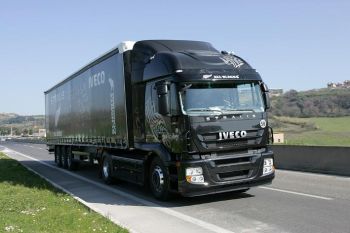 |
|
The criteria for mobility regulations must be based on the
actual environmental performance of vehicles, rather than on the technologies
which they employ reckons Iveco CEO Paolo Monferino. |
|
|
|
The criteria for mobility regulations must be based on the
actual environmental performance of vehicles, rather than on the technologies
which they employ. This is according to Paolo Monferino, Chief Executive Officer
of Iveco, in his closing speech at the conference “Energy and transport: an
integrated approach for a sustainable future”.
The conference was co-organised by Iveco and the Mario Magnetto
Foundation in conjunction with the Turin Chamber of Commerce, whose President,
Alessandro Barberis, delivered the opening address. It focused on the themes of
energy and the mobility of people and goods, and included a series of speeches
given by institutions and academic authorities. In particular, the President of
the Piedmont Region, Mercedes Bresso, placed the accent on renewable energy
projects in addition to cooperation, training and communication programmes.
Paolo Monferino underlined the way in which sustainable mobility
depends on concerted action between public decision-makers and industrial
decision-makers, with specific reference to the themes of vehicle-infrastructure
communication and intermodality. In particular, Iveco’s contribution centres on improving air
quality: for many years the company has been manufacturing vehicles whose
emission levels anticipate European regulations. Iveco is the leading European
constructor of compressed natural gas (CNG) vehicles, whose emission levels are
well below proposed Euro 5 limits. Furthermore, Iveco is committed to the
development of commercial vehicles powered by hybrid and electrical technology,
and is conducting advanced road tests in conjunction with international
transport operators.
The CEO of Iveco went on to discuss the renewal of the existing
vehicle fleet, bearing in mind that in Italy, more than 30% of commercial
vehicles still conform to Euro 0 emission standards, and another 30% are Euro 1
and Euro 2 vehicles. “The environmental benefits derived from the performance of
‘clean’, highly energy-efficient vehicles are partially undermined by the mass
of obsolete vehicles which are still circulating on our roads. Consequently, the
rapid improvement of air quality requires the rapid renewal of the existing
vehicle park.”
“There are various ways to encourage this renewal, from incentive-based policies
to the adoption of differentiated tolls and access restrictions based not on the
technology used by vehicles, but on their actual environmental performance,”
concluded Monferino. “Let us look for example at how the European Commission
decided for the commercial vehicles to enforce emission standards. It
established fixed limits, but enabled constructors to choose the technologies
with which to achieve these targets.”
Iveco designs, manufactures, and markets a broad range of light,
medium and heavy commercial vehicles, off-road trucks, city and intercity buses
and coaches as well as special vehicles for applications such as fire fighting,
off-road missions, defence and civil protection. Iveco employs over 26,000 people and runs 27 production units
in 16 Countries in the world using excellent technologies developed in 5
research centres. Besides Europe, the company operates in China, Russia,
Australia, Argentina, Brazil, and South Africa. More than 4,600 service outlets
in over 100 Countries guarantee technical support wherever in the world an Iveco
vehicle is at work.
|